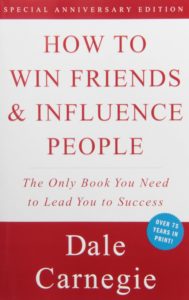If I were to summarize this book in one word…classic.
I have been told by many successful people that Dale Carnegie’s “how to win friends and influence people” is a must read.
Upon completion, I understand why.
However, I need to be honest with you. I bought the paperback version of the book but couldn’t get into it because of the way it’s written.
The book was first published in 1936 and uses language that is a bit different than today. However, I purchased the book through Audible and I am glad I did.
The average person may read this and think “well no kidding” because some of the advice is trivial. But when you get into the book and hear all of Dale’s stories about how his teachings have affected his students you can’t help but reflect on your own actions.
This book is powerful because it forces you to stop and think about how you interact with those you love and care about.
I have frequently found myself stopping and thinking about lessons learned from this book before conversating with friends and family.
Here is a brief outline of what is covered in “how to win friends and influence people”
Overview
Part 1:
- Principle 1 – Don’t criticize, condemn, or complain
- Principle 2 – Give honest and sincere appreciate
- Principle 3 – Arouse in the other person an eager want
Part 2:
- Principle 1 – Become genuinely interested in other people
- Principle 2 – Smile
- Principle 3 – Remember that a person’s name is to that person the sweetest and most important sound in any language
- Principle 4 – Be a good listener. Encourage others to talk about themselves
- Principle 5 – Talk in terms of the other person’s interests
- Principle 6 – Make the other person feel important – and do it sincerely
Part 3:
- Principle 1 – The only way to get the vest of an argument is to avoid it
- Principle 2 – Show respect for the other person’s opinions. Never say, “You’re wrong”
- Principle 3 – If you are wrong, admit it quickly and emphatically
- Principle 4 – Get the other person saying “yes, yes” immediately
- Principle 5 – Let the other person do a great deal of the talking
- Principle 6 – Let the other person feel that the idea is his or hers
- Principle 7 – Try honestly to see things from the other person’s point of view
- Principle 8 – Be sympathetic with the other person’s ideas and desires
- Principle 9 – Appeal to the nobler motives
- Principle 10 – Dramatize your ideas
- Principle 11 – Throw down a challenge
Part 4:
- Principle 1 – Begin with praise and honest appreciate
- Principle 2 – Call attention to people’s mistakes indirectly
- Principle 3 – Talk about your own mistake before criticizing the other person
- Principle 4 – Ask questions instead of giving direct orders
- Principle 5 – Let the other person save face
- Principle 6 – Praise the slightest improvement and praise
- every improvement. Be “hearty in your approbation and lavish in your praise”
- Principle 7 – Give the other person a fine reputation to live up to
- Principle 8 – Use encouragement. Make the fault seem easy to correct
- Principle 9 – Make the other person happy about doing the thing you suggest
Biggest Insights
There are two things that stick out in my mind after reading Dale Carnegie’s how to win friends and influence people.
1. Remember that person’s name is the sweetest thing for them to hear. It’s so true. When you use someone’s name when addressing them you are able to grab their full attention. Especially if you don’t know them very well. A person is more engaged when their name is used.
2. Let the other person save face. I remember the story Dale told about being a guest at a dinner party. Dale was asked to settle an argument that he was sure to know the answer to. Instead of answering with the truth, he sided with the host’s argument (knowing full well it was wrong). His logic was the host would be more accepting of Dale in the future because he allowed him to have the upper hand in his own house. Very smart indeed.
Join The Newsletter
Get occasional emails from me when I publish new projects and articles.



